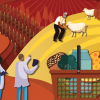
The IIASA-ISC Resilient Food Systems report looks at the vulnerabilities in the food system and recommends changes to move forward through COVID-19 recovery plans that prioritize society’s least protected.
The COVID-19 pandemic has amplified and brought to the fore existing vulnerabilities and global interdependency in societal institutions, including the food system. The pandemic has exaggerated the scarcity in some areas’ food supplies and highlighted the divide between the haves and have-nots.
The number of people suffering from poverty had been on a steady decline, going from 2 billion people in 1990 to 740 million in 2015. However, for the first time in decades, the global poverty rate is once again increasing due to the pandemic. Early estimates suggest that an additional 88 million to 115 million people may suffer extreme poverty, with the total rising to as many as 150 million by 2021.
The socioeconomic impacts of the pandemic are further exacerbating inequalities within and between countries, and intensifying the rise in food insecurity observed since 2014. It has been estimated that the effects of the pandemic could have longer-term repercussion for low-income countries, greatly undermining their development prospects, unless sufficient international support is provided.
In order to explore how the world can recover from the crisis sustainably, IIASA and the International Science Council (ISC) launched the Consultative Science Platform: Bouncing Forward Sustainably Post COVID-19. The two organizations have drawn on their combined strengths, expertise, and large scientific communities, to come up with a set of insights and recommendations based on a series of online consultations that have brought together over 200 experts from all regions of the world. The Resilient Food Systems report is a contribution to this effort.
 © IIASA
© IIASA
Resilient Food Systems
Transformations within reach:
Pathways to a sustainable and resilient world
While the pandemic exerted supply and demand shocks across economic sectors, the report highlights that the food system was particularly affected by impacts on employment and income in relation. This is because international food supply has been strong, and the supply-demand ratios have remained stable throughout the pandemic. However, job and income losses, insufficient safety nets, and constraints on local access to food created conditions for food insecurity.
Lack of access to basic services, such as water and sanitation, and the prevalence of informal employment, have forced many people in low- and middle-income countries to make the impossible choice between following physical distancing measures or maintaining basic income and access to food. Before the pandemic, an estimated 3 billion people were unable to afford a healthy diet on a consistent basis.
Therefore, the report argues that the emphasis on efficiency – which has in large part been driving the evolution of food systems – must be balanced with an emphasis on concerns related to resilience and equity. With this, the food system can combat future crises while serving society’s most vulnerable. The recovery process should be harnessed to strengthen the preparedness of the food system to manage multiple risks.
As highlighted by the pandemic, this would entail expanding the scope and reach of social safety nets and protection schemes. Future food systems should be characterized by better pricing-in of environmental externalities. The sustainable management of natural resources should be seen as an integral part of strengthening the resilience of food systems, recognizing also the close linkage between human and planetary health concerns.
In light of resilience and sustainability concerns the focus should be on using agricultural areas that we already have, rehabilitating degraded environments, and looking into the potential of diversification of practices and technologies.
The role of different agricultural practices in building resilience needs to be looked into. This includes high-tech solutions like biotechnology, as well as an increase in the trade of agricultural goods, a sustainable increase in crop yields, and using underutilized crops to their full potential.
This also means protecting biological diversity, minimizing the destruction of pristine natural environments and focusing on the regeneration of natural ecosystems.
The report also states that strong international institutions are necessary to coordinate policies and limit tensions between multiple social, economic, and environmental interests represented within food systems internationally. Further funding, integration, and emphasis on context-specific solutions can help make changes, and emerging action-oriented knowledge and funding platforms are being used to help transform the food systems.
It is very important that these reforms are characterized by global collaboration, keeping nutritional security at the forefront with society’s most vulnerable people in mind, so that no one gets left behind.
For more information on how COVID-19 is impacting the food system, and the lessons learned from the pandemic, read the IIASA-ISC Resilient Food Systems Report.
You can also watch the discussion on Strengthening Science Systems as part of the launch event for the Bouncing Forward Sustainably: Pathways to a post-COVID World, which explores the key themes of Sustainable Energy, Governance for Sustainability, Strengthening Science Systems and Resilient Food Systems.
This blog post was first published on the website of the International Science Council. Read the original article here.
Note: This article gives the views of the author, and not the position of the Nexus blog, nor of the International Institute for Applied Systems Analysis.